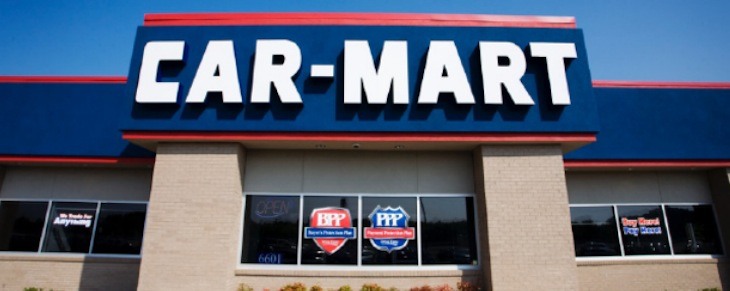Car-Mart profit, revenue beat analyst estimates in first quarter
by August 16, 2018 6:56 pm 662 views

America’s Car-Mart first-quarter earnings and revenue rose 55.7% and 12%, respectively, beating analysts’ estimates, as investments into the company’s general manager recruitment and training program have started to show. The Bentonville-based buy here, pay here used car dealer also has plans to open three dealerships.
After the markets closed Thursday (Aug. 16), Car-Mart reported net income of $10.874 million, or $1.53 per share, in the first quarter of fiscal 2019, which ended July 31, up from $6.982 million, or 90 cents per share, in the same period in fiscal 2018. Revenue was $164.015 million.
Earnings beat estimates by 38 cents, based on a consensus of four analysts. Revenue beat estimates by $11.585 million.
Same-store revenue increased 12.1%, compared to 2.1% in the same period in 2017. The number of vehicles sold increased 5.9% to 12,533, average monthly sales per dealership increased 5.7% to 29.8, and average retail sales price rose 6.1% to $11,015. Prices rose in part because of increased sales of SUVs and trucks and an increase in vehicle purchase costs, said Vickie Judy, chief financial officer.
At the end of the quarter, Car-Mart had 140 dealerships, flat from last year. On Aug. 3, Car-Mart opened its 141st dealership in Fayetteville. The company also plans to open dealerships in Bixby, Okla., Montgomery, Ala., and Conway, President and CEO Jeff Williams said.
Net charge-offs were flat at 6.4%. After a vehicle is repossessed, it is sold on the wholesale market, and any differences between the loan amount and the wholesale proceeds are the net charge-offs. Accounts over 30 days past due declined to 3.5%, from 4.6%. Collections increased to 13.1%, from 12.4%.
Active auto loans increased 5.8% to 72,800. Net finance receivables rose 7.7% to $398.373 million. Gross profit margin increased 20 basis points to 41.6%. Average contract terms fell to 32.4 months, from 32.6 months. Average down payment declined 10 basis points to 6.1%.
“We are happy with the progress we are making, and it is nice to see the hard work, dedication and commitment of our associates translate into good, solid top and bottom line results for the quarter,” Williams said, adding that investments into Car-Mart’s general manager recruitment, training and advancement program have started to show in financial results.
“Our future manager bench is getting stronger, and we are excited to see many passionate people take advantage of the unique career opportunities that Car-Mart provides,” he said. “Within the training efforts, a significant amount of attention is being directed toward being ‘world-class’ in our inventory management practices.”
The majority of the company’s increased spending on selling, general and administrative expenses is related to payroll expenditures as the company continues to train, develop and recruit employees, Judy said. The company also is refocusing its marketing expenses to increase its digital presence and advertising.
The company repurchased 115,999 shares of common stock in the first quarter, and since February 2010, Car-Mart has repurchased 5.9 million shares at an average price of $35.
Shares of Car-Mart (NASDAQ: CRMT) closed at $67, up $2.05 or 3.16% on Thursday. After hours, the stock price reached $71.15, up $4.15, or 6.19%. If the price holds, it would be a 52-week high, and in the past 52 weeks, the stock has ranged between $68.20 and $33.05.
PRICES RISE
Wholesale used vehicle prices rose 1.51% in July, from June, and are up 5.1%, from July 2017, according to the Manheim Used Vehicle Value Index. The index reached a record high of 136.9 in July.
Prices started an abnormal rise in June and continued to increase in July. At the same time, the best-selling vehicles at Manheim are worth more now than a month ago, and many vehicles are worth more now than they were worth a year ago. Continued price increases are expected to be tougher through the remainder of the year, compared to last year. Recent weekly increases were higher than last year, and will keep prices greater than last year.
The summer price increase in used vehicles is partly a result of a strong economy at its peak as consumers are challenged to afford vehicles, leading them to buy used instead of new vehicles, according to Manheim. These conditions have led to strong used vehicle prices for over a year. Import tariff fears might push the vehicle prices even higher. Higher prices and the decline in supply might encourage buyers to purchase now as they expect prices to be higher later.
Prices of more affordable vehicles have risen by the greatest amount, including midsize and compact cars, up 7.2% and 5.2%, respectively. SUV, van and pickup prices rose 4.5%, 3.4% and 3.3% respectively.
In July, used vehicle sales volume rose 3%, from the same month in 2017, according to Cox Automotive. The pace of used vehicle sales has increased 1% from the same time last year and was driven by franchised used vehicle sales, up 2% in July, and private party used vehicle sales, up 4% in July. Seasonally adjusted annual rate of sales for used vehicles is projected to be 39.2 million, and this is the strongest July level in six years.
